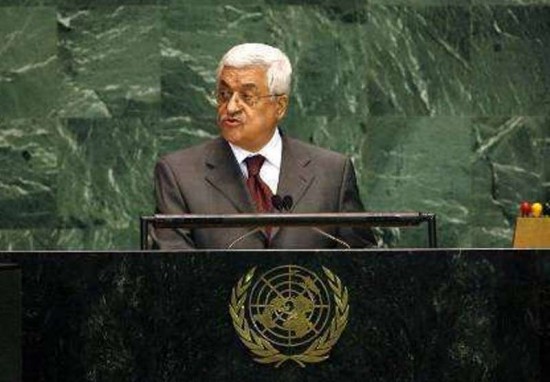Will Palestinian statehood bid shatter EU unity?
Claire Rosemberg
BRUSSELS, Claire Rosemberg- In the scramble to head off "a diplomatic train crash" in New York over Palestinian UN membership, the European Union is striving to match its diplomatic weight to its Middle Eastern economic clout.
Though Israel's leading economic partner and the Palestinians' leading donor, the EU for years has played second fiddle to the United States in the region, in part due to divisions left by history -- Germany fiercely pro-Israeli, Spain and France more favourable to the Palestinian cause.

"The US position is so difficult, as is Israel's, that it is up to the Europeans now to come up with an intermediate solution," said Mariano Aguire of the Norwegian Peacebuilding Resource Centre.
That was exactly what French President Nicholas Sarkozy did at the United Nations on Wednesday, suggesting the UN admit Palestine, but not as a full member, with a status currently held by the Vatican.
"Why not envisage offering Palestine the status of United Nations observer state? This would be an important step forward," Sarkozy said.
It would also smoothe the bloc's divisions over the fractious Middle Eastern problem.
After months of shuttle diplomacy to bring both sides of the conflict back to the negotiating table, the looming crisis at the United Nations has threatened to undermine the bloc's efforts to speak with a single voice on the world stage, fresh from awkward divergences over Libya.
"We are still widely divided," one EU diplomat said. "There is a huge risk at the EU level."
With that in mind, as well as fears a US veto could unleash trouble on the Arab street, European leaders and EU foreign policy chief Catherine Ashton, nearly two years into the job, have been working to convince the Palestinians to take the softer option of UN observer state.
"Intense diplomacy to prevent a diplomatic train crash on Middle East peace. We must find a way forward for everyone," tweeted Swedish Foreign Minister Carl Bildt from New York.
Ashton notably asked the Palestinians last week to pledge not to take Israel to the International Criminal Court (ICC) should they win UN recognition as a non-member state.
"It's like asking people not to go to court if a crime is committed against them," Palestinian negotiator Nabil Shaath said on Monday.
Should the Palestinians sign on to that option, the next question will be whether the divided EU gives it full support or not.
The European Council on Foreign Relations said this week that at a UN General Assembly vote, "the votes of the 27 EU member states are the big prize." In a paper, it urged EU nations to vote "yes" for an upgrade of the Palestinians' UN status from "observer" to "non-member state."
"This pivotal role gives Europeans the chance to inject some vitality into the flagging prospects of a two-state solution for the Middle East," the Brussels-based think tank added.
Given the more than one billion euros ($1.37 billion) spent by EU nations each year in support of a two-state solution, "they should also engage with the Palestinians and urge them to take account of legitimate Israeli concerns" -- such as the thorny issue of the ICC.
But another EU diplomat told AFP on condition of anonymity that to smoothe over the divisions, a group abstention might be the best solution.
At talks earlier this month, Europe's foreign ministers stood poles apart, with Germany, the Czech Republic and the Netherlands staunchly opposed to the Palestinian bid, but Spain favourable.
"We believe that we need to have a negotiated settlement as quickly as possible," said Ashton. "There is no resolution before the UN yet."
European nations and their diplomats have remained tight-lipped in the last weeks as to a joint EU position as leaders tried to buy time and seek an alternative in the form of a new workable peace offer.
Speaking from the UN General Assembly, British Foreign Secretary William Hague said: "The best outcome of all the negotiations and discussions taking place here in New York this week would be if Palestinians and Israelis agreed to go back in to negotiations together.
"We along with all the other 26 countries of the European Union have withheld our position on how we would vote on any resolution that may come forward in the General Assembly in order to exert as much pressure on both sides to return to negotiations.
"That is the only real way forward."
---------------------------------------------------------------------------------------